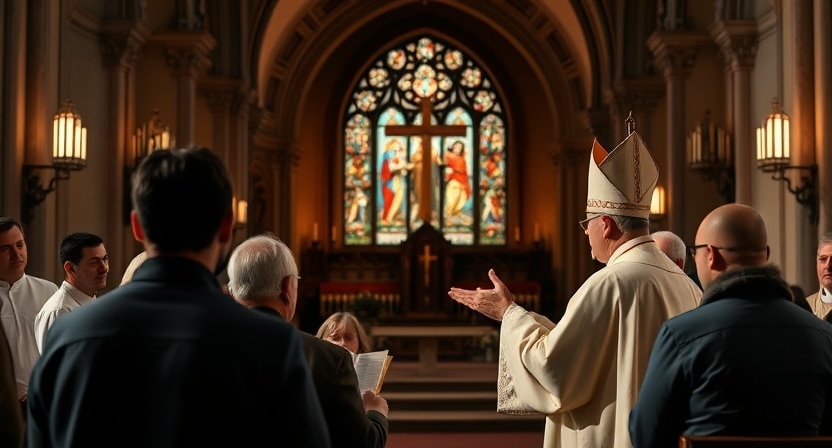FIRST SUNDAY OF ADVENT YEAR A
Waking from sleep
INTRODUCTION AND CONFITEOR
Today we begin the Church’s liturgical year. This gives us a chance to make a fresh start. Advent is not a time for sleep. Today’s readings urge us to wake up. Let us begin by asking the Lord’s forgiveness and help. [Pause].
Lord, you teach us to walk in your ways. Lord, have mercy.
You teach us to take the path of peace. Christ, have mercy.
You teach us to walk in your light. Lord, have mercy.
HEADINGS FOR READINGS
First Reading (Isaiah 2: 1-5). With its vision of universal peace, this reading is surely on of the most inspiring in the Bible. But it also challenges Christians to work for this new world which was inaugurated by Christ.
Second Reading (Romans 13: 11-14). St Paul urges us to wake up; to turn away from the darkness of evil, and to walk in the light of Christ.
Gospel (Matthew 24:37-44). This Gospel urges us to stay awake because we do not know the day or the hour when Christ will return.
1st Reading – Isaiah 2:1-5
1 The word that Isaiah the son of Amoz saw, concerning Judah and Jerusalem.
2 And in the last days the mountain of the house of the Lord shall be prepared on the top of mountains, and it shall be exalted above the hills: and all nations shall flow unto it.
3 And many people shall go, and say: Come, and let us go up to the mountain of the Lord, and to the house of the God of Jacob: and he will teach us his ways, and we will walk in his paths. For the law shall come forth from Zion: and the word of the Lord from Jerusalem.
4 And he shall judge the Gentiles and rebuke many people: and they shall turn their swords into plowshares and their spears into sickles. Nation shall not lift up sword against nation, neither shall they be exercised any more to war.
5 O house of Jacob, come ye: and let us walk in the light of the Lord.
Responsorial Psalm – Psalms 122: 1-2, 3-4, 4-5, 6-7, 8-9
R. Let us go rejoicing to the house of the Lord.
1 I rejoiced at the things that were said to me, We shall go into the house of the Lord.
2 Our feet were standing in thy courts, O Jerusalem
R. Let us go rejoicing to the house of the Lord.
3 Jerusalem, which is built as a city, which is compact together
4 For thither did the tribes go up, the tribes of the Lord
R. Let us go rejoicing to the house of the Lord.
4 The testimony of Israel, to praise the name of the Lord.
5 Because their seats have sat in judgment, seats upon the house of David.
R. Let us go rejoicing to the house of the Lord.
6 Pray ye for the things that are for the peace of Jerusalem: and abundance for them that love thee.
7 Let peace be in thy strength: and abundance in thy towers.
R. Let us go rejoicing to the house of the Lord.
8 For the sake of my brethren, and of my neighbours, I spoke peace of thee!”
9 Because of the house of the Lord our God, I have sought good things for thee.
R. Let us go rejoicing to the house of the Lord.
2nd Reading – Romans 13:11-14
Brothers and sisters:
11 And that knowing the season; that it is now the hour for us to rise from sleep. For now our salvation is nearer than when we believed.

12 The night is passed, and the day is at hand. Let us therefore cast off the works of darkness, and put on the armour of light.
13 Let us walk honestly, as in the day: not in rioting and drunkenness, not in chambering and impurities, not in contention and envy:
14 But put ye on the Lord Jesus Christ, and make not provision for the flesh in its concupiscences.
Alleluia – CF. Psalms 85:8
R. Alleluia, alleluia.
8 Show us Lord, your love;
and grant us your salvation.
R. Alleluia, alleluia.
Gospel – Matthew 24:37-44
37 Jesus said to his disciples: “And as in the days of Noah, so shall also the coming of the Son of man be.
38 For as in the days before the flood, they were eating and drinking, marrying and giving in marriage, even till that day in which Noah entered into the ark,
39 And they knew not till the flood came, and took them all away; so also shall the coming of the Son of man be.
40 Then two shall be in the field: one shall be taken, and one shall be left.
41 Two women shall be grinding at the mill: one shall be taken, and one shall be left.
42 Watch ye, therefore, because ye know not what hour your Lord will come.
43 But know this ye, that if the goodman of the house knew at what hour the thief would come, he would certainly watch, and would not suffer his house to be broken open.
44 Therefore, you also be ready, because at what hour you know not the Son of man will come.”
HOMILY
The readings of Advent plunge us back into the times when God’s people awaited the coming of the Messiah. It’s as if at the start of Advent we enter a time-machine, and are transported back to the time of John the Baptist, and further back again to the times of the great prophets of the Old Testament. These prophets spoke about the coming of the Messiah, thus keeping alive the hopes of the People of God.
But we are in a very different position. We have known the coming of the Messiah. It would be a futile exercise to place our-selves back in the days when the people still awaited his coming. We must live in the present. But perhaps we are tempted to ask: ‘Yes, we have known the coming of the Saviour, but what difference has it made? Does the world not go on as if he had never come?’ These are indeed very relevant questions.
A famous monastery fell upon hard times. Whereas once it teemed with young monks, ‘so that its church rang with prayer and singing, now it was nearly deserted. Visitors no longer came there to pray and seek spiritual guidance. Only a handful of elderly monks shuffled disconsolately about its silent and gloomy Cloisters.
Now in a hut in a nearby wood there lived a holy old rabbi. The monks had a very high regard for him and felt sustained by his prayerful presence. One day the abbot went to visit the rabbi and opened his heart to him. The rabbi received him warmly. It was as though he had been expecting him for a long time.
They sat down in the little hut. On a small table the Scriptures lay open. They talked for some time, each shedding tears at having discovered one another. After the tears had ceased they sat on in silence. Then the rabbi said: ‘You and your brothers are serving God with heavy hearts. You have come to me seeking a teaching. I will give you a teaching, but what I am going to say I will say once, and once only’.
Then the old rabbi looked at the abbot and said: ‘Tell your brothers that the Messiah lives among them’. The abbot could scarcely believe what he had heard. He wanted to ask many questions, but the rabbi said: ‘Go now’. And the abbot left without even looking back.
The next morning he called his monks together in the chapter room. He told them that he had received a teaching from the old rabbi, that he would say it once, and no one was to repeat it or ask questions. They looked at him full of expectation. Then he said: ‘My brothers, the rabbi said that the Messiah is among us’. On hearing this the monks were overcome with surprise and joy, and they asked themselves: ‘Could it really be true? Could Brother John be the Messiah? Could Brother James be the Messiah? Could I be the Messiah?’
They were deeply puzzled, but no one asked any questions of their abbot. As time went by, the monks began to treat one another with a deep and genuine reverence. There was a gentle, warmhearted, human quality about them now which was hard to describe but easy to notice. They lived as men who had finally found something. And yet they prayed and read the Scriptures as if they were still looking for something further.
People soon noticed that something unusual had happened in the monastery, and visitors began to stream to it. From far and wide they came to be nourished by the prayer and charity of the monks, and young men were soon asking to join the community. And once more the church rang with prayerful music, and the Cloisters filled with life, so that the monastery became a centre of faith, hope, and love for all who lived in that part of the world.
We still await the final coming of Christ in glory. Therefore, quite rightly the Advent liturgy is dominated by the ‘coming of the Messiah’. But let us not forget that the Messiah has come, and that he lives among us. If we lose a real and active faith in Christ’s presence among us, then we could easily slide downhill like those monks in the story. We could lose our sprit. Worse, we could love our hope. Christians without hope are like a desert landscape.
If we go back in time, we do so in order to appreciate the greatness of what we are heirs to. We are heirs to the promises God made through the prophets. To his contemporaries, who failed to see this, Christ said: ‘Many people desired to see the things that you see, and did not see them, to hear the things that you hear, and did not hear them’. He was complaining about their lack of faith. The great readings of Advent help us to become aware of the great things that are offered to us through Christ.
We must not live in the past. We must live in the present. We must believe that Christ is among us, without ceasing to wait and pray for his final coming. Therefore, we must not serve God with heavy hearts. We must be alive, awake, active in good works faithful servants of Christ our Master.
If it is true that for many people today the presence of Christ means very little, then we have a teaching for them. Better again, we have a task to perform among them. This task is to make Christ’s presence real for all these doubters and unbelievers. Each of us must try to be a copy of Christ. But what is needed most of all is the witness of Christian community. Christians as‘ a body must show Christ to the world by the way they love one another, and by the joy and hope they radiate. But as St Paul suggests (cf. second reading) they will be very poor witnesses to the light of Christ if they them-selves live in darkness.
‘Of what use is it to search for God in holy places if you have lost him in your heart?’ (Anthony de Mello).
‘Once you encounter God, you will no longer be the same person you were before’. (Catherine de Hueck Doherty).
PRAYER OF THE FAITHFUL
As we wait in joyful hope for the final coming of Christ, let us pray that we may be alive to his presence among us, and eager to do his work in the world. R. Lord, hear us in your love.
For the Christian community: that through the practice of prayer and fraternal love it may give effective witness to Christ in the world. [Pause]. We pray in faith.
For all our temporal leaders: that they may not spare themselves in working to bring about a just and peaceful society. [Pause]. We pray in faith.
That we may encounter Christ in the Eucharist, and thus grow in faith, hope, and love. [Pause]. We pray in faith.
For local needs.
Let us pray:
Lord, as we begin this new year, help us to see you more clearly, to love you more dearly, and to follow you more nearly. We ask this through you, who live and reign with the Father and the Holy Spirit, one God, for ever and ever.
SIGN OF PEACE
Isaiah said: ‘They will hammer their swords into plough-shares, and their spears into sickles. Nations will not lift sword against nation, and there will be no more war or training for war’. Lord, grant that the world may turn away from war, so that all of God’s children may enjoy the peace and unity of your kingdom where you live for ever and ever.
COMMUNION REFLECTION
In today’s second reading St Paul said:
‘The night is almost over, it will be daylight soon’.
An ancient rabbi once asked his pupils
how they could tell when the night was passed
and the day was on its way back again.
One suggested:
‘When you see an animal in the distance,
and you can tell whether it is a sheep or a goat’.
Another said:
‘When you see a tree in the distance,
and you can tell whether it is a fig tree or a peach tree’.
But the rabbi was not impressed.
His own answer was as follows:
‘It is when you can look at the face of any human being,
and see there the face of a brother or sister,
because if you cannot do this,
then no matter what time it is,
for you it is still the night’.


